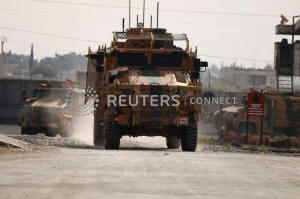Russia says Syrian Kurd forces pulling back from Turkish border
 Send a link to a friend
Send a link to a friend
 [October 24, 2019]
By Maria Kiselyova and Daren Butler [October 24, 2019]
By Maria Kiselyova and Daren Butler
MOSCOW/ISTANBUL (Reuters) - Kurdish forces
have begun withdrawing from areas near the Turkish frontier in Syria,
Russia's deputy foreign minister was quoted as saying on Thursday,
following a deal between Moscow and Ankara that ended Turkey's
cross-border military offensive.
Under Tuesday's accord, sealed by presidents Vladimir Putin and Tayyip
Erdogan in the Russian city of Sochi, Russian military police and Syrian
border guards are required to remove all Kurdish YPG militia 30 km (19
miles) from the Turkish border over a roughly six-day period.
Ankara views the YPG as terrorists with ties to Kurdish insurgents
operating in southeast Turkey.
"We note with satisfaction that the agreements reached in Sochi are
being implemented," Interfax news agency quoted Russian Deputy Foreign
Minister Sergei Vershinin as saying.
"Everything is being implemented," he said.

Russia will send a further 276 military policemen and 33 units of
military hardware to Syria in a week to help implement the deal, RIA
news agency cited a defense ministry source as saying. The first Russian
military police arrived in the northern Syrian town of Kobani on
Wednesday.
Next Tuesday, Russian and Turkish forces will start to patrol a 10 km
strip of land in northeast Syria where U.S. troops had for years been
deployed along with their former Kurdish allies.
Asked whether there would be joint patrols with the Russians or separate
coordinated patrols, Turkish security sources said on Thursday Ankara
was still working on the issue and that the 150-hour period set for the
YPG to withdraw had only just begun.
"SUPER-POWER OF PEACE"
The arrival of the Russian police marks a shift in the regional balance
of power just two weeks after U.S. President Donald Trump pulled out
U.S. special forces, a move criticized in Washington and elsewhere as a
betrayal of the Kurds.
Turkish troops and their Syrian rebel allies subsequently launched an
offensive into northeast Syria against the YPG.
It "paused" the offensive last week under a U.S.-brokered ceasefire
which called for YPG fighters to withdraw, and then secured Russian
support in Sochi for a wider deal requiring the YPG's removal from the
whole northeast border.
[to top of second column]
|

Turkish soldiers in military vehicles return from the Syrian town of
Tal Abyad, as they are pictured on the Turkish-Syrian border in
Akcakale, Turkey, October 24, 2019. REUTERS/Huseyin Aldemir

Trump said on Wednesday the ceasefire was now permanent and lifted
sanctions imposed on Turkey over its offensive.
The Turkish public has shown strong support for the military
operation, encouraged by an overwhelmingly pro-government media.
"The super-power of peace, Turkey," said the main headline in
Thursday's edition of the pro-government Sabah newspaper.
"We got the result we wanted," said the Yeni Safak newspaper
headline.
According to the results of an opinion poll published by pollster
Areda Survey last week, more than three quarters of Turks supported
the so-called Peace Spring Operation. The findings were based on the
responses of 2,160 people between Oct. 11-14.
However, the incursion has deepened a sense of alienation among
Turkey's Kurds, which is also being fueled by a crackdown on the
country's main pro-Kurdish party.
Kurds make up some 18% of Turkey's 82 million people.
A Turkish security official said on Thursday that Turkey was
currently training personnel on the S-400s and that the April 2020
timeline was still in place.
Turkey's military operation was widely condemned by its NATO and
European Union allies, who said it was causing a fresh humanitarian
crisis in Syria's eight-year conflict and could let Islamic State
prisoners held by the YPG escape and regroup.

U.S. Defense Secretary Mark Esper is expected to focus on Turkey's
offensive and the future of the fight against Islamic State at a
NATO gathering this week.
(Additional reporting by Tuvan Gumrukcu in Ankara; Editing by Gareth
Jones)
[© 2019 Thomson Reuters. All rights
reserved.]
Copyright 2019 Reuters. All rights reserved. This material may not be published,
broadcast, rewritten or redistributed.
Thompson Reuters is solely responsible for this content. |